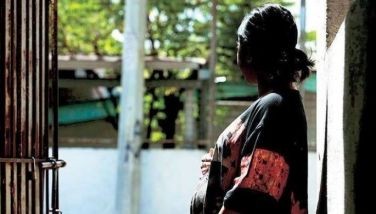‘Government inaction’ hit for journalists’ killings
April 7, 2005 | 12:00am
A "culture of violence, encouraged by government inaction" is the main reason for the deaths of 66 journalists in the Philippines since democracy was restored in 1986, according to the findings of an international study released yesterday.
The report by the Brussels-based International Federation of Journalists (IFJ) said that with three journalists killed already this year, 2005 was shaping up to be worse than last year when 13 journalists were murdered.
"This report puts the government of the Philippines on notice: the world is watching," warned IFJ President Christopher Warren.
"The government of President Gloria Arroyo must halt the bloodshed of our colleagues and the citizens of the Philippines," Warren said.
The report, "A Dangerous Profession: Press Freedom Under Fire in the Philippines," is the result of an international fact-finding mission to the Philippines earlier this year.
The mission was prompted by the Philippines having the dubious honor of placing second only to Iraq as the most deadly place for journalists to work, according to the IFJ, which represents over 500,000 journalists in more than 110 countries.
Key findings show that of the 66 journalists killed since 1986, only one case has been successfully prosecuted.
"Tolerance of a culture of violence involving senior government officials is responsible for the high death toll," the report said.
The report recommended that a "safety office" be established to develop and deliver training programs on ethics, human rights, self-protection and how to cover hostile regions for journalists in the Philippines.
It also called on the government to expand Task Force Newsmen, a body set up by the President, to include non-governmental organizations and to effectively investigate the cases of journalists killed.
The IFJ has also called on the international community to lobby the Philippine government and judiciary to successfully prosecute the cases.
"By speaking to the families and employers of the slain journalists in the Philippines, as well as to regional officials, we have gained an understanding of the factors that contributed to these tragic deaths," said Australian journalist Gerard Noonan, who headed the IFJ delegation to the Philippines.
Wiith him were Indonesian Rustam Mandayun, Inday Espina-Varona, chairperson of the IFJ-affiliated National Union of Journalists in the Philippines, NUJP secretary general Carlos Conde, NUJP directors Rowena Carranza-Paraan and Diosa Labiste, and NUJP treasurer May Rodriguez.
A delegation from the Paris-based global press watchdog, Reporters Without Borders, is due to arrive in the Philippines today to look into the deaths of journalists.
The move was prompted by the Holy Week murder of columnist Marlene Esperat, an anti-corruption crusader who was killed in front of her children at her home in Tacurong City, Sultan Kudarat last March 24.
Esperat’s killing came less than a month after Arnulfo Villanueva, a columnist of a community newspaper in Cavite, was slain on Feb. 28. And on Feb. 2, Edgar Amoro, a freelance broadcaster and a key witness in the killing of journalist Edgar Damalerio, was gunned down in Pagadian City. — With AFP, Benjie Villa
The report by the Brussels-based International Federation of Journalists (IFJ) said that with three journalists killed already this year, 2005 was shaping up to be worse than last year when 13 journalists were murdered.
"This report puts the government of the Philippines on notice: the world is watching," warned IFJ President Christopher Warren.
"The government of President Gloria Arroyo must halt the bloodshed of our colleagues and the citizens of the Philippines," Warren said.
The report, "A Dangerous Profession: Press Freedom Under Fire in the Philippines," is the result of an international fact-finding mission to the Philippines earlier this year.
The mission was prompted by the Philippines having the dubious honor of placing second only to Iraq as the most deadly place for journalists to work, according to the IFJ, which represents over 500,000 journalists in more than 110 countries.
Key findings show that of the 66 journalists killed since 1986, only one case has been successfully prosecuted.
"Tolerance of a culture of violence involving senior government officials is responsible for the high death toll," the report said.
The report recommended that a "safety office" be established to develop and deliver training programs on ethics, human rights, self-protection and how to cover hostile regions for journalists in the Philippines.
It also called on the government to expand Task Force Newsmen, a body set up by the President, to include non-governmental organizations and to effectively investigate the cases of journalists killed.
The IFJ has also called on the international community to lobby the Philippine government and judiciary to successfully prosecute the cases.
"By speaking to the families and employers of the slain journalists in the Philippines, as well as to regional officials, we have gained an understanding of the factors that contributed to these tragic deaths," said Australian journalist Gerard Noonan, who headed the IFJ delegation to the Philippines.
Wiith him were Indonesian Rustam Mandayun, Inday Espina-Varona, chairperson of the IFJ-affiliated National Union of Journalists in the Philippines, NUJP secretary general Carlos Conde, NUJP directors Rowena Carranza-Paraan and Diosa Labiste, and NUJP treasurer May Rodriguez.
A delegation from the Paris-based global press watchdog, Reporters Without Borders, is due to arrive in the Philippines today to look into the deaths of journalists.
The move was prompted by the Holy Week murder of columnist Marlene Esperat, an anti-corruption crusader who was killed in front of her children at her home in Tacurong City, Sultan Kudarat last March 24.
Esperat’s killing came less than a month after Arnulfo Villanueva, a columnist of a community newspaper in Cavite, was slain on Feb. 28. And on Feb. 2, Edgar Amoro, a freelance broadcaster and a key witness in the killing of journalist Edgar Damalerio, was gunned down in Pagadian City. — With AFP, Benjie Villa
BrandSpace Articles
<
>
- Latest
- Trending
Trending
Latest
Trending
Latest
Recommended































